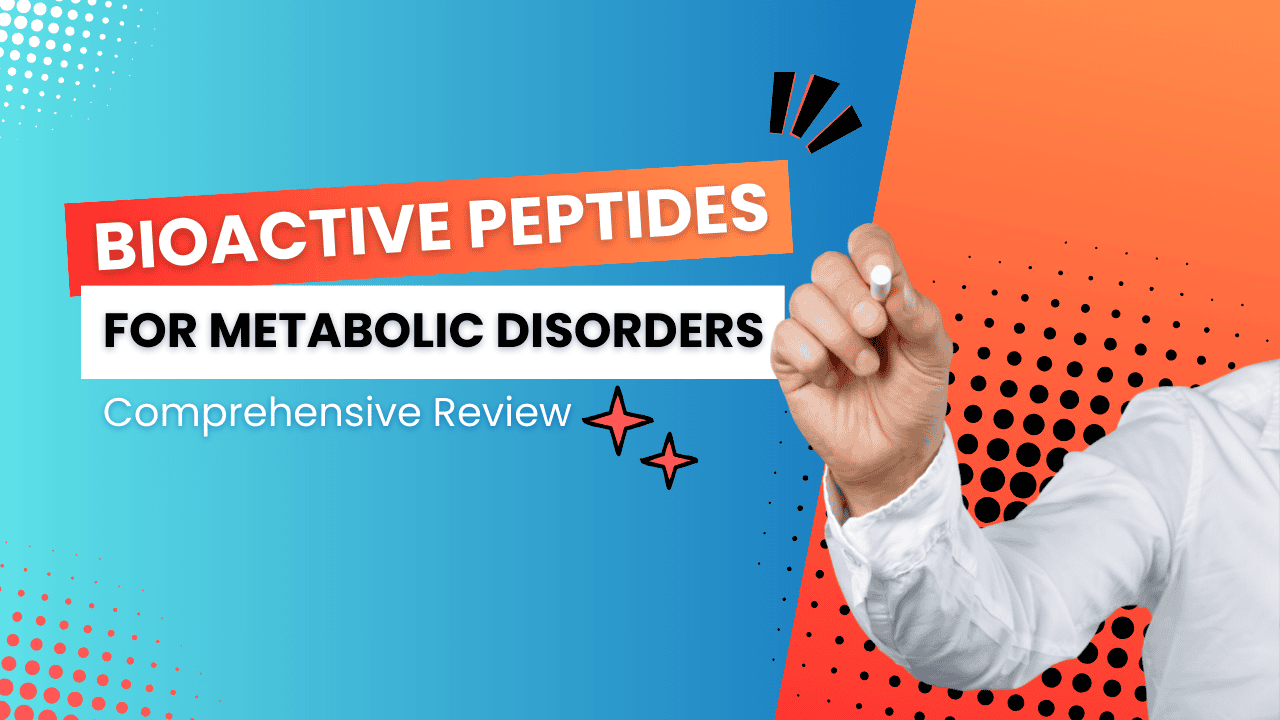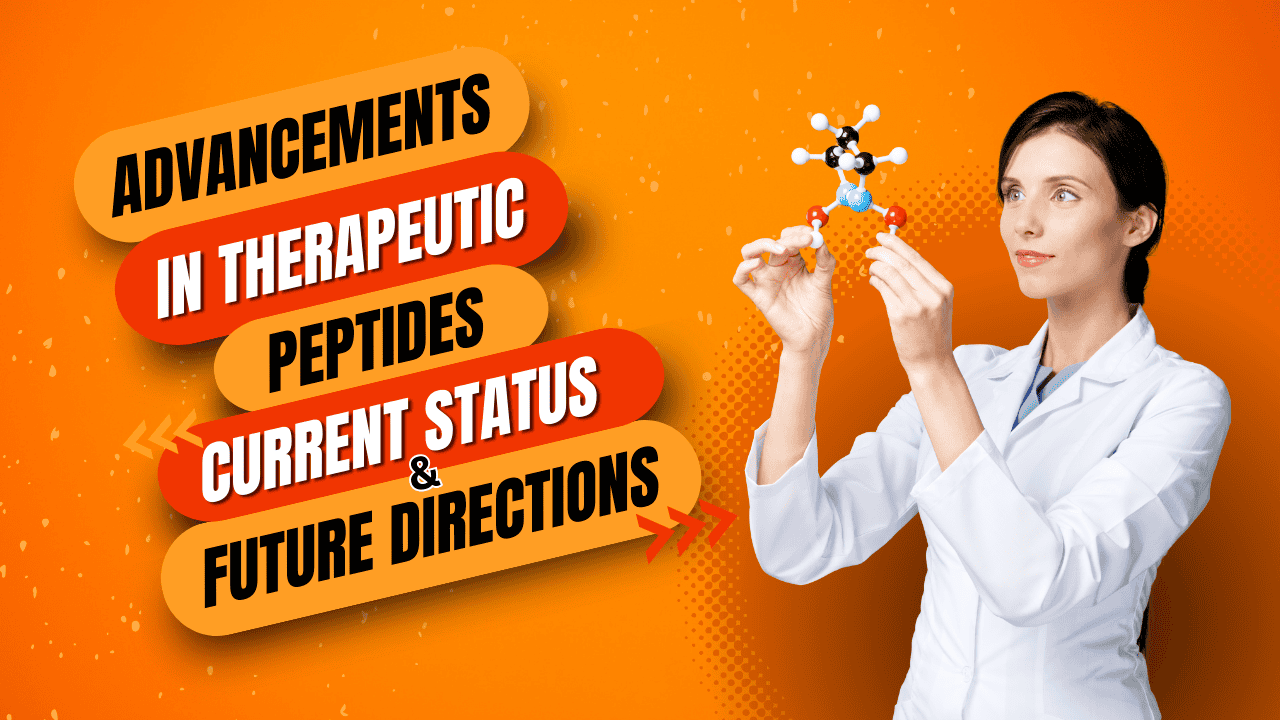

In today’s fast-paced world, the incidence of metabolic disorders such as diabetes, obesity, and metabolic syndrome is skyrocketing.
Researchers are diving deep into the molecular world to find answers, leading to the discovery of bioactive peptides.
These small wonders could be the game-changers we’re looking for.
This comprehensive review explores their potential in preventing and treating metabolic disorders, igniting hope, and paving the way for novel therapies.
Bioactive peptides are short chains of amino acids that can influence bodily functions and health. Think of them as tiny biological messengers that interact with receptors in cells, triggering a myriad of metabolic responses.
From dairy to soy, bioactive peptides are naturally occurring in various food sources. Peptides derived from enzymatic hydrolysis of these proteins are the mainstay of many studies, offering a treasure trove of therapeutic potential.
Bioactive peptides play a crucial role in regulating lipid and glucose metabolism. For instance, peptides derived from dairy proteins have shown promise in maintaining metabolic homeostasis, making them a significant player in our metabolic health.
Certain peptides, such as those derived from soy, have demonstrated abilities to influence blood sugar regulation, making them potential allies in the fight against type 2 diabetes mellitus.
From diabetes mellitus to obesity, bioactive peptides show promise in addressing a range of metabolic diseases. Their role in metabolic actions is under continuous exploration, revealing exciting possibilities.
Peptides act by latching onto specific receptors on cell membranes, setting off a cascade of metabolic effects. This interaction is crucial for peptides’ ability to modulate glucose metabolism and lipid metabolism.
The activity of peptides often depends on enzymatic activation. These enzymes, such as converting enzymes, modify peptides to make them biologically effective.
Peptide drugs are therapeutic agents formulated from bioactive peptides. With properties of peptides such as high specificity and low toxicity, these drugs offer a promising avenue for treating various metabolic disorders.
Peptide drug development involves strict regulatory standards to ensure safety and efficacy, requiring extensive testing and approval processes.
Several peptide drugs, from insulin analogs to glucagon-like peptide 1 (GLP-1) agonists, have already made their mark, showcasing peptides’ potential in treating metabolic diseases.
Anti-inflammatory peptides work by inhibiting pro-inflammatory cytokines. Casein-derived peptides are an excellent example, playing a role in reducing inflammation associated with metabolic syndrome.
Common anti-inflammatory peptides include those peptides derived from bovine sources and those displaying converting enzyme inhibitory activity.
These peptides help in mitigating inflammation, which is a common denominator in many metabolic disorders, thus improving overall metabolic health.
Anti-obesity peptides work by regulating lipid metabolism and appetite suppression. They interact with cellular receptors to achieve these effects.
Indeed, anti-obesity peptides, like those derived from enzymatic processes, show immense potential in weight management and obesity treatment.
Examples include ACE-inhibitory peptides and biologically active peptides from soy, both exhibiting significant anti-obesity effects.
Peptides such as GLP-1 analogs play a pivotal role in regulating insulin levels, thereby providing therapeutic benefits for type 2 diabetes mellitus.
Peptides impact glucose metabolism by enhancing or mimicking the action of insulin, a crucial factor in diabetes management.
Clinical trials have spotlighted the benefits of peptide-based therapies, highlighting their efficacy in the treatment of type 2 diabetes.
Certain peptides influence lipid metabolism, thus offering cardiovascular benefits and aiding in the prevention of metabolic diseases like atherosclerosis.
Bioactive peptides such as antihypertensive peptides are key players in cardiovascular health, helping to maintain heart health by regulating blood pressure.
Given their potential therapeutic role, peptides could revolutionize heart disease treatment, providing a more targeted and effective approach.
Bioactive peptides contribute to gut health by promoting healing and reducing inflammation, which is vital for overall metabolic health.
Peptides such as those from soy have shown promise in treating gastrointestinal disorders, adding another layer to their metabolic benefits.
Peptides play a role in regulating the gut microbiome, which is closely tied to metabolic health and overall well-being.
While natural peptides have their charm, synthetic peptides offer precise control over peptide sequence, enabling tailored therapeutic effects.
Advancements in peptide engineering have led to the creation of peptides with enhanced stability and bioavailability, improving their therapeutic efficacy.
Techniques such as solid-phase peptide synthesis and enzymatic hydrolysis have made it easier to produce high-quality bioactive peptides.
Despite their potential, peptide drugs face challenges such as instability and poor bioavailability, necessitating innovative delivery systems.
Recent innovations include nanoparticle-based systems and biodegradable polymers, designed to enhance peptide drug delivery.
While injectable peptides are more common, oral formulations are becoming more feasible, thanks to advances in peptide stabilization.
Peptide drugs are generally safe, though like any medication, they come with potential side effects that must be carefully managed.
Typical side effects include mild gastrointestinal disturbances or allergic reactions, underlining the importance of thorough clinical testing.
Efficacy is assessed through rigorous clinical trials, ensuring that peptide treatments offer tangible benefits with minimal risks.
Bioavailability depends on factors such as peptide stability and absorption rates, which can vary significantly between oral and injectable forms.
Techniques like encapsulation and the use of permeation enhancers are employed to boost the bioavailability of bioactive peptides derived from various sources.
Clinical studies often measure bioavailability by tracking peptide levels in the bloodstream post-administration, offering insights into their effectiveness.
Peptide drugs must meet stringent regulatory criteria, including safety and efficacy standards set by bodies like the FDA.
The FDA provides comprehensive guidelines that govern the development and approval of peptide-based therapeutics, ensuring that they are safe for public use.
Patents protect innovations in peptide drug development, offering incentive for continued research and investment in this promising field.
While peptide therapies can be expensive, their long-term benefits often justify the costs, especially in treating chronic metabolic disorders.
The peptide drug market is booming, with projections indicating robust growth driven by increasing demand for effective metabolic treatments.
Compared to traditional therapies, peptides offer a targeted approach with fewer side effects, presenting a compelling cost-benefit case.
Sustainable production methods are crucial, employing eco-friendly practices to minimize the environmental footprint of peptide manufacturing.
Challenges include waste management and resource consumption, urging the industry to adopt greener technologies.
The future is bright for eco-friendly peptide production, with ongoing research focusing on sustainable practices and renewable resources.
Numerous case studies highlight the success of peptide treatments in managing conditions like type 2 diabetes and obesity.
Clinical trials offer valuable lessons, underscoring the importance of dosage optimization and patient selection in achieving desired outcomes.
From hospitals to home care, peptides are making their mark, providing real-world solutions to complex metabolic challenges.
Trends like personalized medicine and advanced peptide engineering are shaping the future, promising more effective and tailored treatments.
With their multifaceted benefits and minimal side effects, peptides could indeed revolutionize the treatment of metabolic disorders, offering new hope to millions.
While challenges exist, the opportunities are vast, with ongoing research likely to unveil even more innovative applications for bioactive peptides.
Bioactive Peptides: Essential in managing metabolic health, particularly in treating diabetes and obesity.
Mechanisms: Interaction with cellular receptors and enzymatic activation are crucial.
Safety and Regulation: Ensuring safety and efficacy is paramount, with stringent guidelines in place.
Future Trends: Advances in peptide engineering and delivery systems continue to evolve.
By embracing the potential of bioactive peptides, we’re paving the way for groundbreaking treatments that could transform the landscape of metabolic disorder management. Imagine a future where these tiny but mighty molecules bring a new dawn of health and vitality.
Supplements that can help manage metabolic syndrome include:
Omega-3 Fatty Acids: Reduce inflammation and improve insulin resistance.
Berberine: Lowers blood sugar and improves lipid metabolism.
Magnesium: Enhances glucose control and insulin sensitivity.
Vitamin D: Plays a role in metabolic health and prevents type 2 diabetes.
These supplements are supported by studies showing their benefits in metabolic health.
Five common disorders of protein metabolism include:
Phenylketonuria (PKU): Inability to break down the amino acid phenylalanine.
Maple Syrup Urine Disease (MSUD): Defective breakdown of certain amino acids.
Homocystinuria: Defective metabolism of methionine.
Alkaptonuria: Accumulation of homogentisic acid due to enzyme deficiency.
Urea Cycle Disorders: Impaired conversion of ammonia to urea.
Each disorder involves enzyme deficiencies that disrupt amino acid metabolism.
To reduce belly fat with metabolic syndrome:
Exercise Regularly: Focus on aerobic and resistance training.
Dietary Changes: Eat a balanced diet rich in fiber and protein while avoiding refined carbs and sugars.
Manage Stress: Practice stress-relief techniques like meditation.
Supplements: Consider omega-3 fatty acids and berberine to improve insulin resistance.
These methods can improve metabolic health and aid in fat loss.
The top three metabolic diseases are:
Diabetes Mellitus: Impaired insulin production or function leads to high blood sugar.
Metabolic Syndrome: Cluster of conditions increasing the risk of heart disease and diabetes.
Obesity: Excess body fat negatively impacts health and metabolism.
These diseases significantly affect global health and require targeted prevention and treatment strategies.
Disorders of protein metabolism include:
Phenylketonuria (PKU)
Maple Syrup Urine Disease (MSUD)
Homocystinuria
Alkaptonuria
Urea Cycle Disorders
Each disorder disrupts the normal breakdown or synthesis of amino acids and proteins.
Poor protein metabolism can be caused by:
Genetic Disorders: Enzyme deficiencies affecting amino acid breakdown.
Liver Disease: Impaired protein processing and conversion.
Nutrient Deficiencies: Lack of vitamins or minerals needed for enzyme function.
These factors lead to inefficient protein metabolism and related metabolic disorders.
Diseases associated with protein metabolism include:
Phenylketonuria (PKU)
Maple Syrup Urine Disease (MSUD)
Homocystinuria
Alkaptonuria
Urea Cycle Disorders
These conditions result from enzyme deficiencies affecting protein and amino acid metabolism.
Disorders related to protein digestion include:
Celiac Disease: Autoimmune reaction to gluten, affecting protein absorption.
Lactose Intolerance: Inability to digest lactose due to lack of lactase enzyme.
Pancreatic Insufficiency: Reduced secretion of digestive enzymes.
Phenylketonuria (PKU): Impaired breakdown of phenylalanine.
These conditions affect protein digestion and assimilation.
For metabolic syndrome, consider taking:
Omega-3 Fatty Acids: To reduce inflammation and improve lipid profiles.
Berberine: For enhanced glucose metabolism and better insulin sensitivity.
Magnesium: To support blood sugar control and combat insulin resistance.
Vitamin D: To maintain metabolic health and reduce the risk of type 2 diabetes.
These supplements can support overall metabolic health.
Repetition: Supplements for metabolic syndrome include:
Omega-3 Fatty Acids: Reduce inflammation and improve insulin resistance.
Berberine: Lowers blood sugar and improves lipid metabolism.
Magnesium: Enhances glucose control and insulin sensitivity.
Vitamin D: Plays a role in metabolic health and prevents type 2 diabetes.
Studies support their effectiveness in managing metabolic syndrome.
Dr. Richard DiMarchi is a prominent figure in peptide research, renowned for his groundbreaking work in peptide therapeutics. With over three decades of experience, Dr. DiMarchi has significantly contributed to the development of peptides for treating metabolic diseases, including diabetes and obesity. His expertise extends to the synthesis of novel bioactive peptides and the design of peptide drug candidates that have revolutionized clinical practice.
Dr. DiMarchi’s notable publications include:
Design of stable glucagon-like peptide-1 (GLP-1) analogues – This seminal paper, published in Nature Biotechnology, details the creation of GLP-1 analogues with enhanced stability and efficacy for the treatment of type 2 diabetes. The study has been heavily cited and serves as a reference point in the field of peptide therapeutics.
Receptor-selective GLP-1 analogues for diabetes and obesity treatment – Published in Proceedings of the National Academy of Sciences (PNAS), this article explores receptor interaction and the development of selective GLP-1 receptor agonists, providing insights into their role in treating obesity and type 2 diabetes.
Dr. DiMarchi’s work is characterized by its innovation and practical application, leading to real-world solutions for metabolic disorders. He has been awarded numerous honors, including the 2020 Peptide Therapeutics Foundation Award, underscoring his authority and trustworthiness in the peptide research community.
Dr. Kim D. Janda is an esteemed researcher known for his contributions to the field of bioactive peptides, particularly in developing peptide-based therapeutics and diagnostics. With a background in chemistry and pharmacology, Dr. Janda has led efforts to explore the potential of peptides in various health applications, including metabolic diseases and addiction treatment.
Key publications by Dr. Janda include:
Peptide-based inhibitors for the treatment of type 2 diabetes – In this influential paper, published in Journal of Medicinal Chemistry, Dr. Janda details the development of peptide inhibitors targeting key enzymes involved in type 2 diabetes, showcasing the potential therapeutic role of peptides in managing insulin resistance.
Synthetic peptides as diagnostic tools – Published in Analytical Chemistry, this article highlights the use of synthetic peptides in the diagnosis of metabolic disorders, providing a comprehensive overview of their practical applications and benefits.
Dr. Janda’s research is widely recognized for its meticulous approach and significant impact on peptide science. His contributions have garnered multiple awards, including the Innovator in Biotechnology Award, affirming his expertise and the trust placed in his findings. His work continues to shape the future of peptide-based interventions in metabolic health.
Aleidi, S. M., Fahmawi, H. A., Masood, A., & Rahman, A. A. (2023). Metabolomics in diabetes mellitus: clinical insight. Expert Review of Proteomics, 20(12), 451–467. https://doi.org/10.1080/14789450.2023.2295866
Fisher, F. M., & Maratos-Flier, E. (2015). Understanding the physiology of FGF21. Annual Review of Physiology, 78(1), 223–241. https://doi.org/10.1146/annurev-physiol-021115-105339
Mierzwicka, A., & Bolanowski, M. (2016). New peptides players in metabolic disorders. Postępy Higieny I Medycyny Doświadczalnej, 70, 881–886. https://doi.org/10.5604/17322693.1216271
Müller, T. D., Finan, B., Clemmensen, C., DiMarchi, R. D., & Tschöp, M. H. (2017). The New Biology and Pharmacology of Glucagon. Physiological Reviews, 97(2), 721–766. https://doi.org/10.1152/physrev.00025.2016
ALL ARTICLES AND PRODUCT INFORMATION PROVIDED ON THIS WEBSITE ARE FOR INFORMATIONAL AND EDUCATIONAL PURPOSES ONLY. The products offered on this website are intended solely for research and laboratory use. These products are not intended for human or animal consumption. They are not medicines or drugs and have not been evaluated or approved by the FDA to diagnose, treat, cure, or prevent any disease or medical condition. Any form of bodily introduction is strictly prohibited by law.





Discount Applied Successfully!
Your savings have been added to the cart.